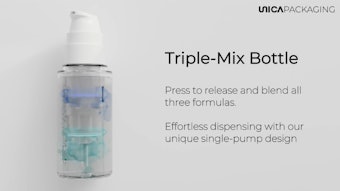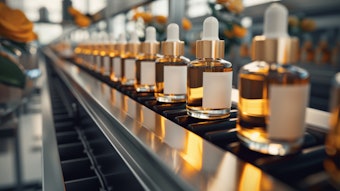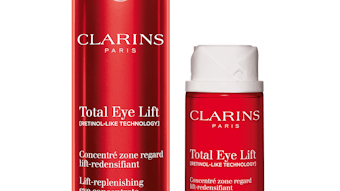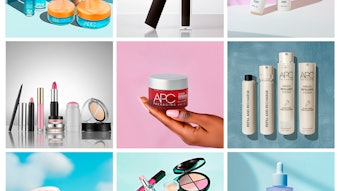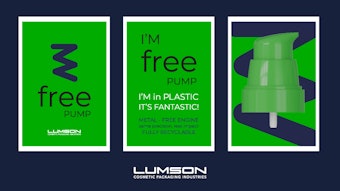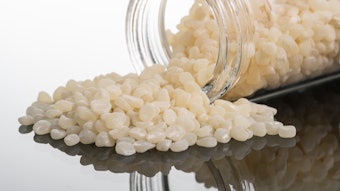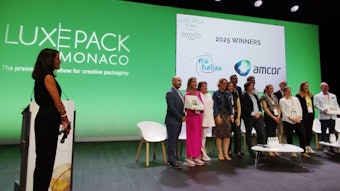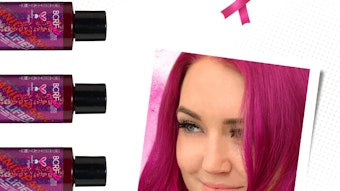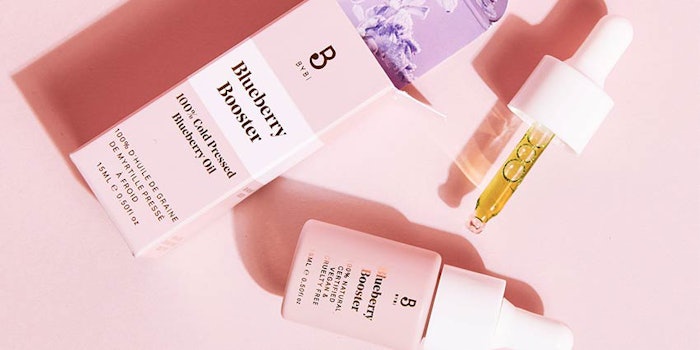
As 2019 comes to a close, conversations about sustainable packaging have fully saturated the beauty and personal care industry. From trade show floors to retailers’ shelves, eco-friendly packaging is becoming progressively commonplace.
The 10th annual Packaging Innovations and Luxury Packaging trade exhibition—held on September 11-12, 2019, at West London’s Olympia Exhibition Center—was no exception.
The event was split between the mass-focused Packaging Innovations section—covering all CPG categories—and the Luxury Packaging event—featuring prestige and bespoke packaging, from hand-crafted drinks bottles to fragrance-emitting, illuminated factices for perfume brands.
Loop is currently available to consumers in Paris and parts of North America. In 2020, the program is expected to go live in London, Toronto, California, Germany and Tokyo.
The show, which was attended by more than 4,700 people, featured 172 global exhibitors specializing in every aspect of the packaging supply chain, from printing to labelling and shipping solutions to point of sale.
Sustainability Spotlight
During the 2019 edition of Packaging Innovations and Luxury Packaging, sustainability-focused exhibits, forums, seminar sessions and packaging solutions were ripe for the picking.
Attendees were given the opportunity to experience:
- The new PlasticFreeLand exhibit from A Plastic Planet, meant to highlight the latest plastic-free, packaging materials;
- A program of 35 seminar sessions covering beauty, drinks and food forums;
- and The design-focused Pentawards Conference; and Sessions dedicated to sustainable packaging—i.e., compostability, recycling and materials.
The Beauty Forum—run by beauty industry journalist, Imogen Matthews—continued the sustainability theme. There was a notable shift from 2016, when the forum’s theme was “Sustainability Versus Glamour.” This year, a standing-room only audience heard from speakers across the beauty spectrum as to how they are embedding sustainability into their purpose, strategies and actions.
Refillable is the New Black
During the forum, Caroline Fréry, VP of business development at TerraCycle, spoke about TerraCycle’s aim to make the unrecyclable recyclable, noting that “There are no technical issues in recycling. It’s all about economics.”
Fréry talked about how reputational uplift from sustainability can square that circle. She focused on TerraCycle’s Loop program, a refillable, reusable packaging platform with hundreds of FMCG (fast-moving consumer goods) brands. Loop is currently available to consumers in Paris and parts of North America. In 2020, the program is expected to go live in London, Toronto, California, Germany and Tokyo.
Ren’s current mission is to be zero waste by 2021, with all packaging either recyclable, recycled or reused.
Fréry explained how packaging involved in Loop becomes an engaging asset to the brand. She cited an exemplar deodorant pack that has an initial cost $3, but provides consumers with 100-plus uses at $.03 per use. A traditional deodorant has a COGS (cost of goods sold) scenario of just $.10 per pack, but is used only once. The reusable format, therefore, is a win for the consumer, brand and environment.
King of Shaves
The refill ecosystem approach is also being taken by King of Shaves, an established British grooming brand. The founder of King of Shaves, Will King, talked about the brand’s new Code Zero range, set for launch in 2020.
With its motto “Buy Once, Refill Forever, Love our Planet,” the Code Zero platform—which King wants to open to other brands—will initially start with aluminum-packaged deodorant displaying a QR code on the bottom to order refills, arriving in sustainable elephant grass-derived cardboard packaging.
King talked about creating the desire for refillable packaging with “drop-dead gorgeous design.” Having had the chance to handle the chunky, smooth hand-feel prototype, I think it’s entirely possible.
Ren Clean Skincare
Ren Clean Skincare’s CEO, Arnaud Meyselle, has a far bigger ship to turn but was similarly passionate about the issue. Ren’s current mission is to be zero waste by 2021, with all packaging either recyclable, recycled or reused. Ren participates in TerraCycle’s Loop but has a range of other brand initiatives underway in its own right.
Meyselle quite rightly pointed out, “There is no one silver bullet for sustainability.”
Meyeslle explained that it’s about shifting consumer perception on what beauty design codes need to be. He stated that “grey is the new green” because post-recycled plastic, as of yet, cannot be the pristine white consumers have become used to. Even Sephora was unconvinced about Ren’s striking 50% PCR-PET canary-yellow and 100% PCR-PET grey-capped SPF tube, but it has since become the retailer’s fastest selling SKU.
Minarovic and Rutterford talked about the ongoing challenge of finding a balance between sustainability and performance—i.e., brands still crying out for truly recyclable atomizers/pumps.
Meyselle also talked about how sustainability needs to be 360° for beauty brands. At Ren Clean Skincare, plastic shiny white gift pouches are to be replaced with a crafted paper pouch with an upcycled zip.
All merchandising stands are now to be made from recycled and upcycled materials. And no more sachet samples. Despite each mini tube sample costing 3.5 times more than a sachet, Meyselle explained that he will not add Ren’s to the billions of unrecyclable sachets produced every year.
BYBI
The final speakers were Dominika Minarovic and Elsie Rutterford, the co-founders of indie vegan, natural, cruelty-free start-up, BYBI. Similar to Glossier, BYBI was launched in 2017 off the back of its Clean Beauty Insiders platform that covered everything in natural beauty, from DIY recipes to product reviews and industry news.
For all the sustainability talk on the stages, on the show floor, it was still very much a sea of single-use plastic, even as exhibitors talked up their eco-friendly game.
Minarovic and Rutterford talked about the ongoing challenge of finding a balance between sustainability and performance—i.e., brands still crying out for truly recyclable atomizers/pumps. The co-founders felt the whole supply chain was geared toward larger brands; with minimum order quantities sometimes set at 10 million, it was impossible for smaller brands to access the best sustainable solutions.
BYBI focuses on optimizing everything it can, including minimal printing on bottles, minimal packaging, no PR send-outs or gift packaging. The is brand even starting its own send-back-and-refill scheme. All in all, a lesson in single-mindedness.
The Top Inspiring Sustainable Show Spots
For all the sustainability talk on the stages, on the show floor, it was still very much a sea of single-use plastic, even as exhibitors talked up their eco-friendly game. There were a few interesting emerging options, however, for beauty brands looking to lessen their environmental impact.
Sensorial Satisfaction
The standout exhibitor of the show, soliciting literal oohs and ahs from visitors, was Organoid. The Austrian company specializes in an organic surfaces comprising rose, lavender, cinnamon, coffee and leaves that can be 0.1 mm thick and applied to a huge range of materials from paper to adhesive film.
Organoid is entirely compostable (the binder is a proprietary food-grade ingredient) and is tactile and fragranced, offering a huge variety of brand activation possibilities from packaging to point of sale. Organic materials from a brand’s own manufacturing processes can be used to create an even more beguiling brand story.
Refillable Results
Packaging manufacturer Toly showcased two new refillable packaging options. The first pack was a hinged refill with flapper to provide an airtight seal for skin care, which is easily clicked in and out of its outer protective case. Both components are made of PP (polypropylene), making for a mono-material design that is easily recycled.
The second pack was an easily removable refillable pump dispenser compact with a fully integrated mirror in the lid, ideal for liquid formulations. Italian company Discos focuses on the production of single-dose strips and packaging for beauty, pharma and nutrition products. During the event, it showcased a new product made from bioplastics.
Paper Perfection
Two exhibitors offered novel solutions to wood pulp packaging.
U.K.-based company Paperwise upcycles agricultural waste, stems and leaves left over after harvest into sustainable paper and board for packaging. The environmental impact is reportedly 47% lower than FSC-paper made from trees and 29% lower than recycled paper.
Seismografics from Germany showed off its Ecovaganza grass-paper e-commerce packaging (used by BYBI), which uses 50% fresh fibers from sun-dried grass. The manufacturing process uses just one liter of water per ton of grass fiber pulp, compared to the several thousand liters per ton of wood fiber pulp, resulting in energy savings of up to 80% per ton of material.
Sara Jones is a partner at Free the Birds (www.freethebirds.com; @freethebirdsLDN), an independent, London-based brand elevation agency delivering strategic branding, design and communications. Now 22 years old, its clients include Coty, P&G, Bayer, Lindt and Nestlé.

